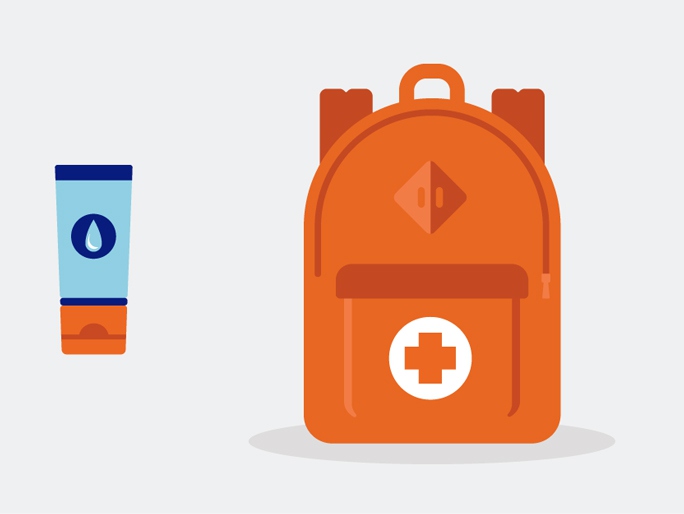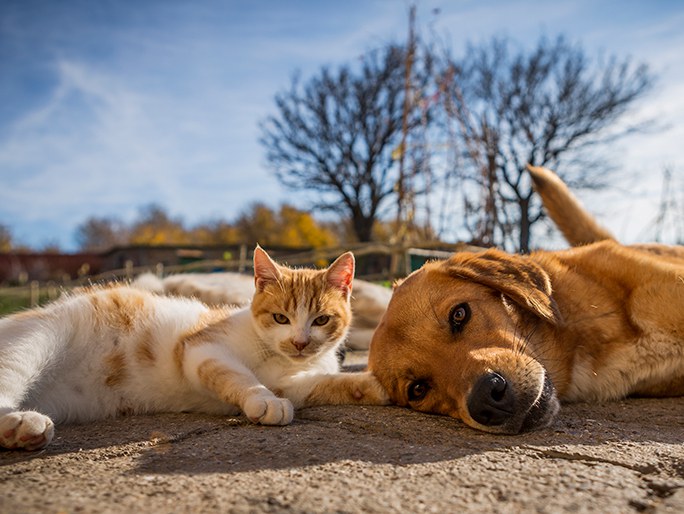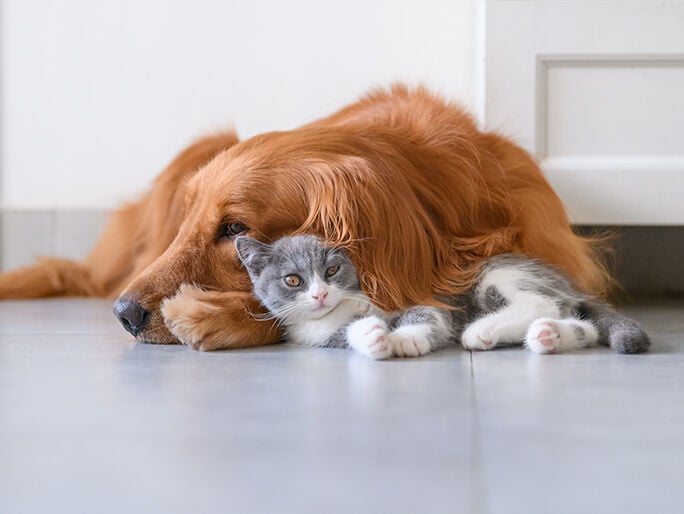know what’s poisonous to pets
Help your cat or dog avoid accidental poisoning from common household items like medications, chemicals, human foods, and plants.
If your cat or dog has been exposed to poison, they can show symptoms right away, or hours or even days later. If you suspect poison, call the Pet Poison Helpline at 1-800-213-6680 (fee applies)
This page does not contain a complete list of potential pet toxins or health risks. If you have any concerns or questions, please reach out to your veterinary team.

Common poisons for dogs and cats
- Select human foods
- Medications for people or pets
- Many house plants and flowers
- Common household chemicals, such as antifreeze
- Several detergents and soaps
- Rodent poisons
- Fertilizers and herbicides

Be aware of food that’s toxic for dogs
- Avocado skin, pits, and leaves
- Grapes and raisins
- Hops from home brewing
- Select kitchen spices, herbs, and baking soda
- Macadamia nuts, even in small amounts
- Moldy or spoiled food

Know what’s especially poisonous for cats
- Acetaminophen (Tylenol)
- Dog (or rabbit) parasite control that contains permethrin
- All true lilies
Know what’s a risk to your furry friend
There’s a lot detailed here already, but even this isn’t a complete or comprehensive list of all potential toxins or health risks for pets. If you’re at all worried, please reach out to your veterinary team.

Keeping toxins out of reach can help protect your pet
Many accidental poisonings can be avoided by keeping toxic materials away from your pet — but what’s toxic to a cat or dog may be very different than what’s toxic for people. Unfortunately, a lot of delicious human foods, cool decorations, and useful chemicals can hurt or even kill your unsuspecting pet.
Pet bodies aren’t designed like people bodies, and they can’t process the same materials in the same way. They also don’t automatically know why a sweet-smelling plant like the lily on your side table isn’t good to eat.
Human food can be dangerous for pets
Pets aren’t humans and their bodies aren’t able to process many human foods. For example, animals can get very sick from even small amounts of alcohol or caffeine.
- Alcohol in any form (beer, wine, etc.)
- Caffeine in any form (coffee, tea, soft drinks, etc.)
- Chocolate
- Raw, cooked, or powdered garlic, onions, leeks, or chives
- Grapes and raisins
- Sugarless candy, gum, or toothpaste with Xylitol
- Yeasted dough (raw bread, pastry dough, etc.)
Prescription or over-the-counter medications can poison pets even in small amounts
Pets can easily overdose or be poisoned by people medication. Never give your pet any kind of human medication or supplement — whether over the counter, recreational, or prescription — unless explicitly directed by your veterinary team.
Human medications
- Pain medication like ibuprofen, naproxen, and acetaminophen (Advil, aspirin, Aleve, Tylenol, etc.)
- Prescription medications for human or pet medical conditions
- Antidepressants or anxiety medications
- ADHD drugs (Ritalin, Concerta, etc.)
- Cold medicines
- Diet pills
- Marijuana and other recreational drugs
- Vitamins and supplements
Pet medications
Pet medications, including flea and tick treatments, should always be used as directed. Call your veterinary team if:
- A pet gets into their own meds and eats more than prescribed
- A pet eats another pet’s meds
- A dog eats cat medication, or vice versa
- A topical dog medication is applied to a cat
Oleander and other house plants can poison pets
Avoid keeping dangerous plants in your house or yard, or make sure they’re strictly out of reach.
- Azaleas and rhododendrons
- Chrysanthemums and other “mums”
- Foxglove
- Lilies
- Mistletoe
- Oleander
- Sago palms
- Tulips, hyacinths, and irises
Common household chemicals can be lethal for pets
Keep household cleaning supplies, fertilizers, pesticides, and car or garage supplies safely stored where pets can’t find them. Dogs may sniff or lick something caustic, while cats may try to groom chemicals off their fur.
Seek immediate emergency care if your pet eats a pesticide containing zinc phosphide: it can create lethal gases inside their bodies.
It’s also extremely important to keep rodenticides (rat poison, rat bait, etc.) far away from your pet. These products often have an enticing flavor that unfortunately attracts many dogs and cats. If ingested, rat poison can cause kidney failure, internal bleeding, and even death.
- Antifreeze and other car chemicals
- Bleach and detergents
- De-icing chemicals and salts
- Expandable foam insulation
- Expandable glue (e.g., Gorilla glue)
- Fertilizers and herbicides
- Household cleaners, including drain and shower cleaners
- Insecticides
- Lead and heavy metals from batteries, paint, or linoleum
- Paint and paint thinner
- Pool chemicals
- Rodent poisons and baits (as well as poisoned vermin)
- Tar
Mentioned in this article
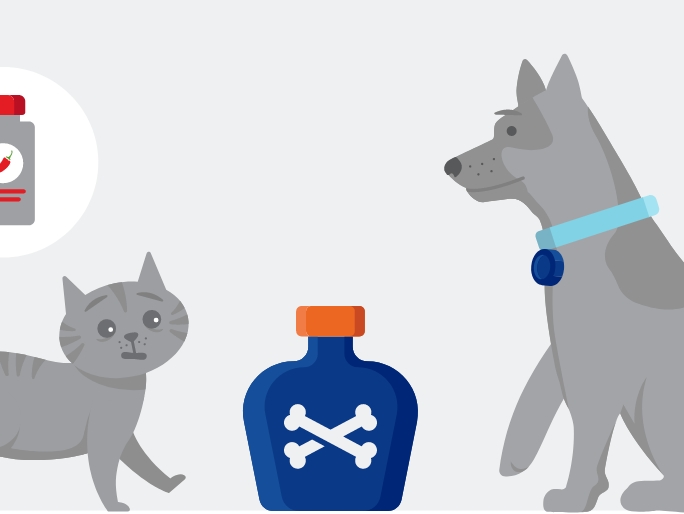
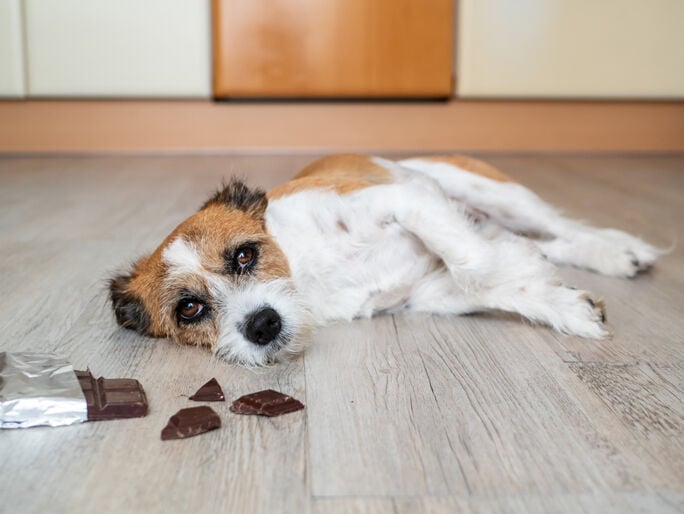
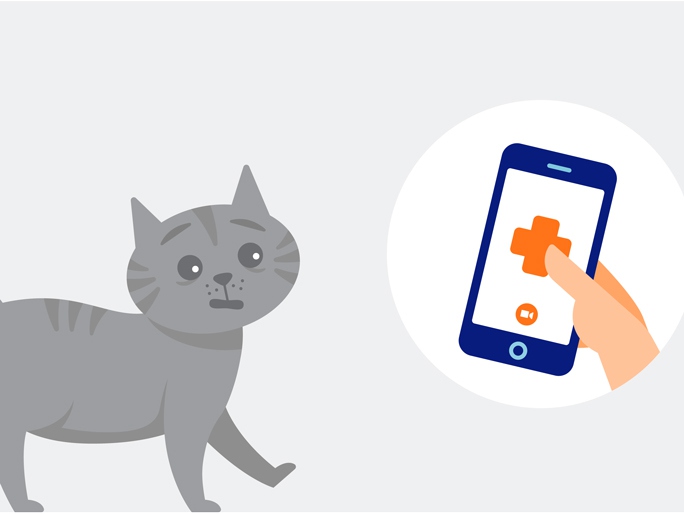

Need advice on flea control? Ping Pet Chat™!
Whether it's 3 a.m. or 3 p.m., connect with a real veterinary professional for immediate petcare advice. It's included in all Optimum Wellness Plans®!
Log in to start chattingHow Banfield can help in a pet emergency
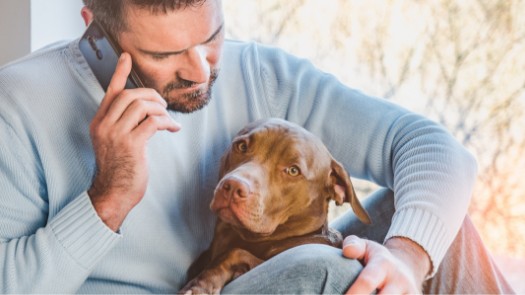
Banfield’s focus is wellness care. In the case of an emergency, call your local veterinary team to see if they have the capacity to see your pet. If not, they may recommend that you go immediately to an emergency hospital.
Costs for urgent care services will depend on location, your pet’s needs, and the services provided. Please speak to your local Banfield veterinary team if you have questions regarding urgent care.
Pet urgent care advice
Call a Banfield near you during hospital hours for advice. Depending on your pet's needs, we can provide a referral for local emergency hospitals or specialty providers. During non-hospital hours, please contact your local veterinary emergency hospital.
Chat with a team member online
All pet Optimum Wellness Plans® come with Pet ChatTM for anytime, anywhere, 24/7 access to live general veterinary advice.
Access pet records in your MyBanfield account
Pet records are available 24/7 in MyBanfield both online and in our app. These include medical records, microchip information, and more. If you lose your records or can't get online, give us a call. A Banfield associate may be able to help you access the information you need.
Want high-quality petcare?
Banfield offers a range of services from comprehensive exams to urgent care advice.
 Mites and mange
Mites and mange Podcast - Not Just Fluff
Podcast - Not Just Fluff

